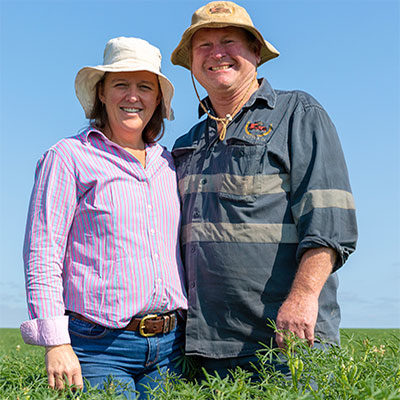
Tanya and Rob Kitto
Regional Winner | Innovator category
Geraldton, WA
Tanya and Rob Kitto are grain growers and 2020 Growth Awards Regional Winners in the Innovator category. Read on to learn more about Tanya and Rob.
What’s the one thing you have done in your career you are most proud of?
Our proudest moment is the fact we looked outside the box, took on something like this value adding on farm, and ran with it. It meant we had to step outside our comfort zone and really believe in ourselves. When we first started, we had plenty of critics saying that others had tried and failed. We don’t give up easily on things that we decide to do. We haven’t made it to the top rung of the ladder yet, but we‘ve certainly learned how to climb the ladder and we are off the ground.
How will you share what you learn with others in the industry?
We like to support and encourage others to follow their dreams.
We are members of grower groups and are always happy to share information, and any information we should gain through a study tour would definitely be shared with others. We do get invited as guest speakers occasionally and anything we would learn on a study tour would be included in those presentations. We have learned a lot through setting up our business and are often approached by others and we are happy to tell them what works and what doesn’t work.
We receive a lot of contact through our social media presence and we get excited when people get in touch.
What do you see as your biggest opportunity in the next 12 months?
Other than growing our retail line, the biggest opportunity is to tackle the export market and we are excited that the business has got to that point. We already have contacts across the world and will be sending product to them and they are happy to help us establish the product in those countries. It is just a matter of being able to grow as the demand comes on, especially if the products are successful overseas. We need to be able to work with the export demand. It could be that we increase the size of our current production mill on farm or it could be that we outsource some processing. Initially it would be exporting wholemeal lupin flour, but we have interest in our mixed products as well.
What is the biggest barrier to achieving success in the next 12 months?
Ironically, it could be increased demand which could be a barrier to success, and it could affect our credibility. We need to be able to walk with our customers overseas before we start to run.
Someone once said it takes six years to be an overnight success and in that six years, we have laid a lot of foundations for this business and we want to start building demand. But it is a balancing act and if demand spikes dramatically and we need to produce more, then we would need to spend $5 million on upsizing our flour mill taking it out of working capital on our farm. Certainly, that would raise some questions with the banks. The banks like to see dollar signs on paper, not just dreams. Everything we do is self-funded, and the business is almost paying its way now.
One of our contacts is in the United States and we are still only a relatively small business. If we send product there and it goes absolutely crazy, then all of the sudden we might start getting orders for thousands of tonnes of this stuff and having to produce that quickly is a pretty big ask.
What is the biggest challenge Australian Ag has to overcome in the next 10 years?
Australia needs to create food products rather than commodities and we are starting to see more of this happening. It may be led by the mum and dad producers who are looking for an edge.
We know that when our agricultural produce is sold as commodities it is not achieving what it should. China buys our feed barley and while some goes into feed rations, a lot goes into brewing. We could do that brewing here in Australia and sell beer, not barley.
I think Australia needs to change its mindset and look at what we grow. Perhaps we need to produce more speciality products or increase the amount of value adding we do. No one cares as much as producers do about the quality they produce. Australia is an innovative country and it’s a pity a lot of our manufacturing has been lost.